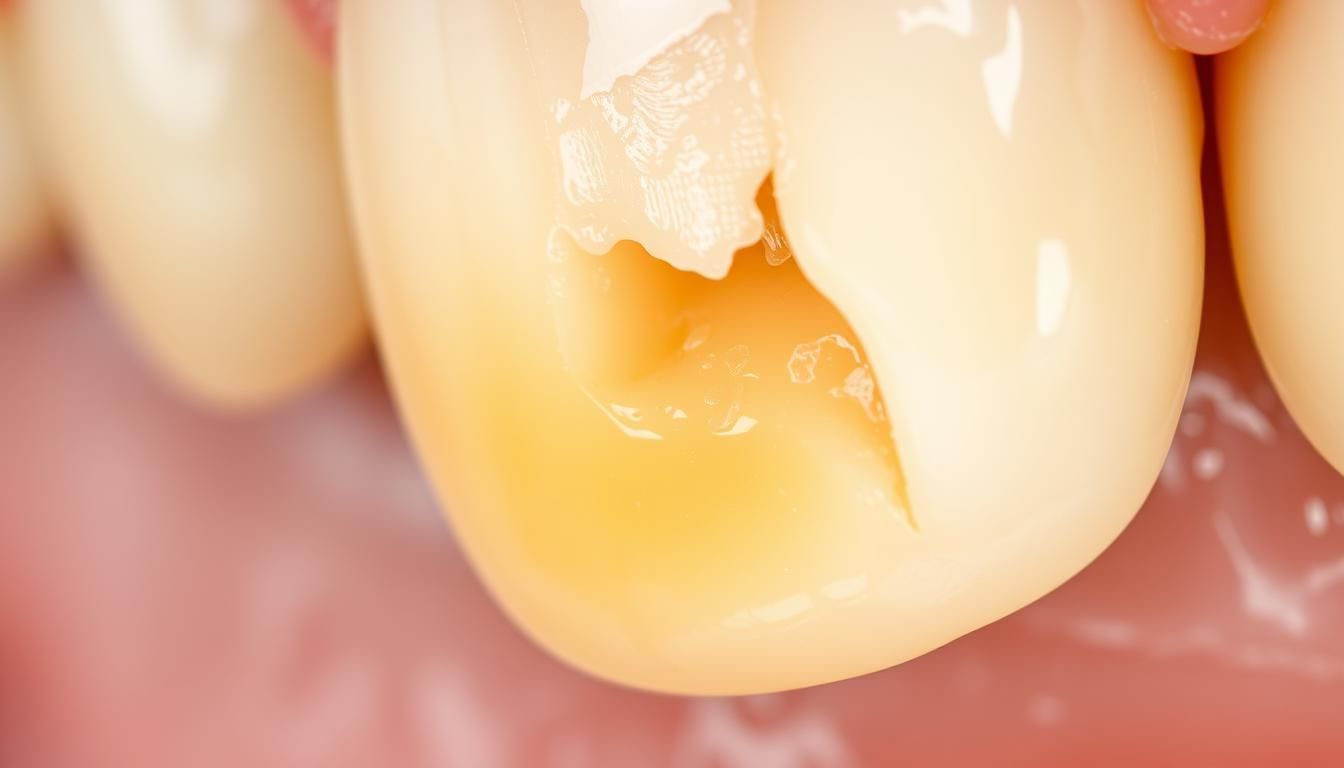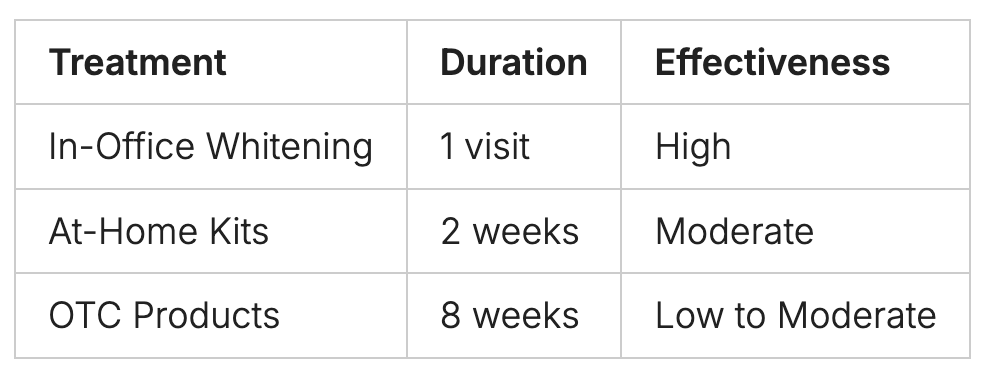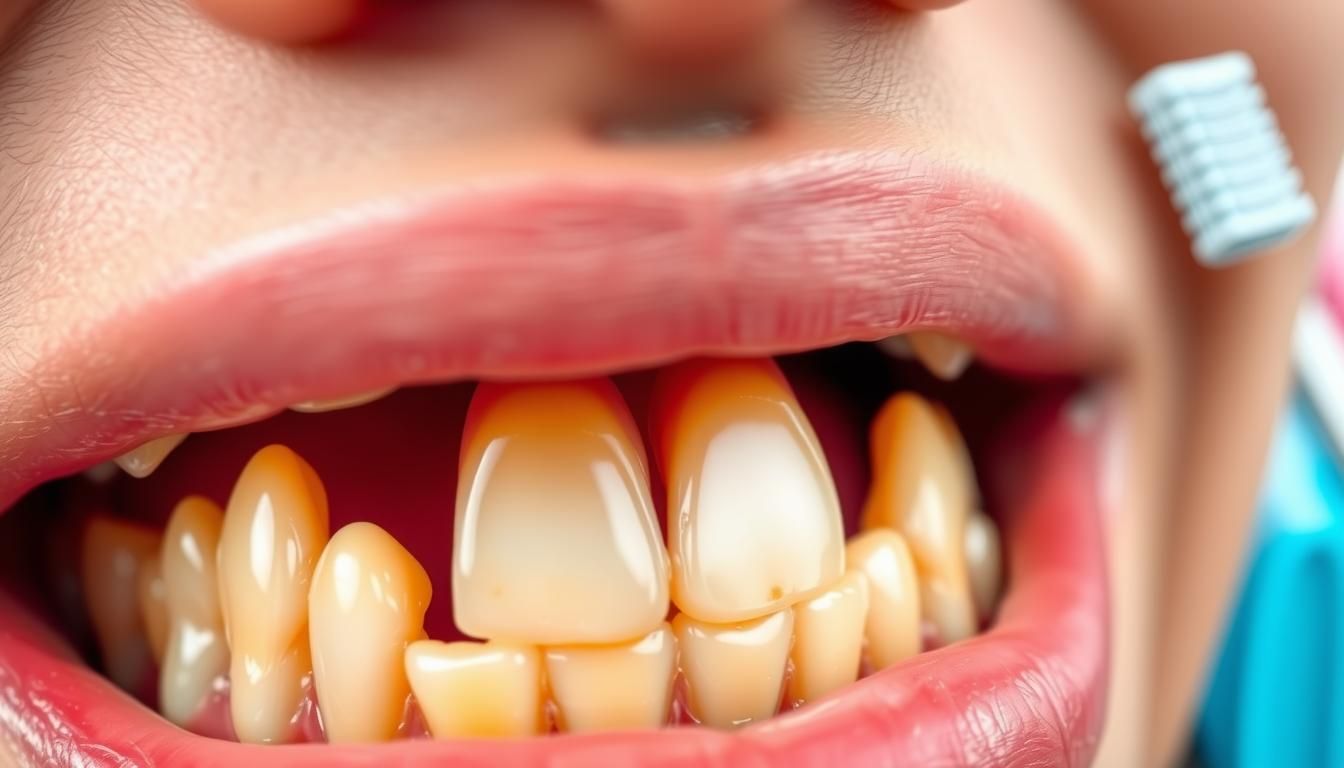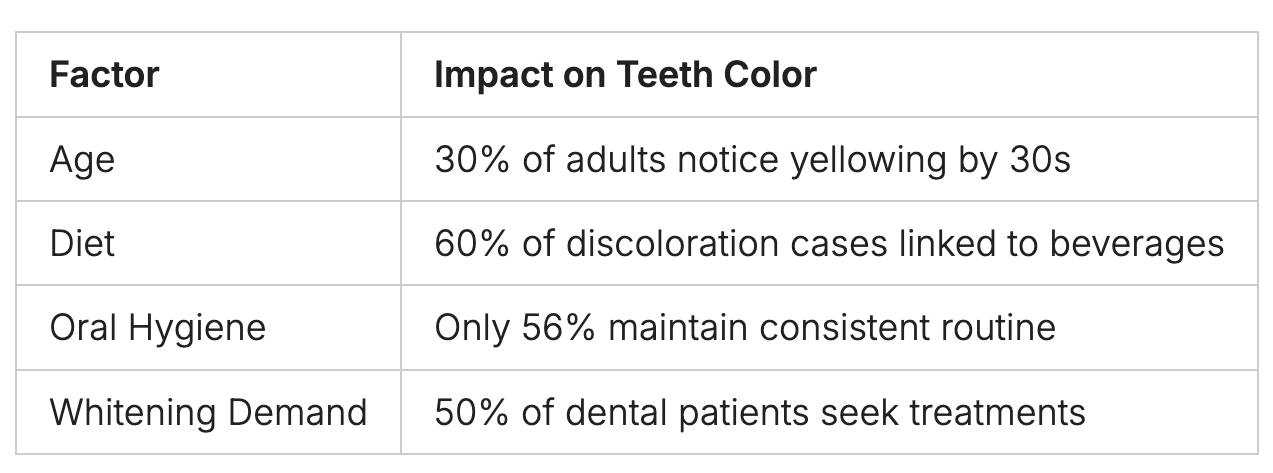New Paragraph
Why Are My Teeth Yellow? And How To Whiten Them!
Why Are My Teeth Yellow? And How To Whiten Them!

A bright, white smile is often seen as a sign of good health and beauty. Yet, many people face the issue of yellow teeth. This problem affects both how we look and how we feel about ourselves.
Studies show that 68% of adults deal with some level of tooth discoloration. Yellow teeth can come from many sources, like our diet, lifestyle, and even our genes. For example, smokers are more likely to have yellow or brown teeth than non-smokers.
Drinking coffee, tea, and red wine can also make teeth more discolored. These drinks can increase tooth discoloration by 40%. As we get older, our teeth naturally darken. Research shows a 20% drop in teeth brightness from age 20 to 50. This change often leads people to look for ways to whiten their teeth.
Understanding why our teeth turn yellow is the first step to a brighter smile. This article will look at the reasons behind yellow teeth and offer tips on whitening. Whether you're thinking about professional treatments or home remedies, we'll help you make the best choice for your smile.
Key Takeaways
- Yellow teeth affect 68% of adults and can impact confidence
- Smoking triples the risk of tooth discoloration
- Diet choices like coffee and wine increase discoloration by 40%
- Teeth naturally darken with age, losing 20% brightness by 50
- Professional and at-home whitening options are available
- Good oral hygiene can reduce discoloration risk by 50%
- Consulting a dentist is key before starting whitening treatments
Introduction
Stained teeth are a common problem that many people face. The discoloration of teeth can sneak up on you. It can affect your smile and how you feel about yourself.
Many things can cause teeth stains, like what you eat and drink, your lifestyle, and even your genes. Drinks like coffee, tea, and red wine can stain your teeth. Smoking also makes teeth darker, with smokers' teeth being 2-3 shades darker than non-smokers'.
Not taking care of your teeth can also lead to yellowing. Bacteria buildup can make your teeth look yellow. Brushing and flossing regularly can help prevent this. In fact, good oral hygiene can cut the risk of stains by up to 75%.
Some reasons for yellow teeth are beyond our control. Medical issues, some medications, and aging can all play a part. Even kids can get stained teeth if they get too much fluoride when they're young.
But there are ways to whiten your teeth. You can try professional treatments or use at-home kits. Professional treatments can make your teeth 3-8 shades lighter. At-home kits can start showing results in just a few days.

To keep your teeth white and healthy, you need to make an effort every day. Combining good dental care, lifestyle changes, and whitening treatments can help you keep a bright smile.
Causes of Yellow Teeth
Many people worry about yellow teeth. Knowing the causes of teeth staining is key to a bright smile. Let's look at what makes teeth turn yellow.
Genetics
Your genes affect your tooth color. If your parents had yellow teeth, you might too. Genetics influence how thick your enamel is and the color of your dentin, impacting your teeth's look.
Dentin Exposure
As we get older, our enamel gets thinner, revealing the yellow dentin. This natural aging can make teeth 20-30% more yellow. Grinding your teeth, often due to stress, can speed up this process.

Foods and Beverages
What you eat and drink can change your tooth color. Coffee drinkers see a 30-40% increase in stains. Red wine, dark colas, and foods like berries and tomato sauces can also make teeth yellow.
Tobacco Use
Smoking is a big reason for yellow teeth. About 85% of long-term smokers have discolored teeth. Tobacco stains are hard to remove, often needing a dentist's help.
Other factors include some medicines, not brushing well, and too much fluoride. Knowing these causes helps prevent and fix yellow teeth.
Prevention of Yellow Teeth
To keep your teeth white, you need good dental care and smart choices. Making a few simple changes can help keep your smile bright and your mouth healthy.
Dietary Changes
What you eat and drink affects your tooth color. Foods like berries and tomatoes can stain teeth. Sugary snacks feed bacteria that cause discoloration. Drinks like red wine, coffee, and black tea also stain teeth.
To prevent yellow teeth, eat less of these foods. Rinse your mouth after drinking them.
Lifestyle Changes
Quitting smoking is a big step in keeping teeth white. Tobacco use causes brown stains on teeth. Some medicines can also change tooth color.
If you're worried, talk to your doctor. They can suggest other options.
Dental Hygiene Practices
Good oral care is vital for white teeth. Brush your teeth twice a day for 2-3 minutes with whitening toothpaste. Floss every day to remove plaque between teeth.
Regular dental visits and cleanings are also important. They help keep your teeth white and your mouth healthy.
- Use a toothpaste with baking soda and hydrogen peroxide
- Try oil pulling with coconut oil to reduce plaque
- Consider whitening strips or rinses for extra brightening
Remember, consistent dental care is key to preventing yellow teeth. Follow these tips and get professional help when needed. This way, you can keep your smile bright and healthy.
Treatments to Whiten Teeth
Teeth whitening treatments offer many options for a brighter smile. You can choose from professional whitening to at-home solutions. There's something for everyone, no matter your budget.
Professional In-Office Whitening
Professional whitening gives the best results. Dentists use strong peroxide gels and UV light. This can make teeth several shades lighter in just one visit.
At-Home Whitening Kits
At-home kits are a handy choice. They come with custom trays and whitening gel. Dentists prescribe them for gradual whitening over two weeks.
Over-the-Counter Whitening Products
Whitening strips, toothpastes, and rinses are easy to find. They might not be as strong, but products like Sensodyne Clinical White can lighten teeth by two shades in eight weeks.
Cosmetic Dentistry Procedures
For really tough stains, cosmetic dentistry might be needed. Procedures like veneers or bonding can give long-lasting results.

Teeth bleaching might make your teeth sensitive for a bit. Always talk to a dentist before starting any whitening treatments. This ensures they are safe and work well.
Conclusion

Yellow teeth are a common issue, affecting up to 80% of adults. While often harmless, stains can lower self-confidence and hint at oral health problems. Knowing the causes and solutions helps people take better care of their teeth.
Good oral health habits are key to avoiding and treating stains. Brushing, flossing, and dental visits are essential for a healthy smile. Professional whitening can brighten teeth by 3 to 8 shades, but about 25% may feel sensitivity.
Natural teeth rarely reach the bright white ideal seen in media. Genetics, age, and lifestyle affect tooth color. By 30, about 30% of adults start to notice yellowing as enamel thins, showing the natural yellow of dentin.

For advice on teeth stains and oral health, talk to us at DC Implant & Cosmetic Dentistry. We can transform your smile with personalized dental solutions designed to meet your unique needs and goals. Whether you're looking to brighten your teeth with professional whitening, perfect your smile with veneers, or restore your confidence with dental implants, we offer a range of tailored treatments to help you achieve a healthier, brighter smile you'll love to show off. Let us create a plan just for you!
Frequently Asked Questions (FAQs)
Let's tackle some common questions about teeth whitening and oral care. Many people ask about why their teeth turn yellow and if whitening methods work.
Can yellow teeth be white again?
Yes, yellow teeth can become white again. Professional teeth whitening treatments can make a big difference. These treatments can last up to 10 years with good oral care. It's interesting that 48% of people remember a smile the most after meeting someone for the first time.
How do you fix yellow teeth?
There are many ways to fix yellow teeth. You can try professional in-office whitening, at-home kits, or over-the-counter products. Dentists suggest getting professional treatments every 5 to 6 months for the best results. But remember, crowns, bridges, fillings, and veneers won't whiten with these treatments.
Why are my teeth yellow even though I brush?
Brushing alone might not stop yellowing. Genetics, aging, and diet play a role. Smoking and drinking coffee, tea, or wine can also cause discoloration. Interestingly, brushing your tongue can cut bad breath by 70%, but it doesn't stop yellowing.
Is it normal to have yellowish teeth?
It's normal for teeth to have a yellowish tint as we age. The enamel wears down, revealing darker shades. While over 30% of Americans are unhappy with their smile, natural tooth color varies. If you're worried, talk to a dentist about your oral care and whitening options.
Source Links
- https://crest.com/en-us/oral-care-tips/teeth-stains/yellow-teeth-causes-how-to-whiten-yellow-teeth?srsltid=AfmBOoosQbOObVBMxF3dq3AjhFOaoZFre4mNi6JpDYbzCYFbJYNe5mfU
- https://altoonasmiles.com/blog/10-reasons-your-teeth-are-yellow-and-what-to-do-about-it/
- https://www.healthline.com/health/dental-and-oral-health/how-to-get-rid-of-yellow-teeth
- https://crest.com/en-us/oral-care-tips/teeth-stains/yellow-teeth-causes-how-to-whiten-yellow-teeth?srsltid=AfmBOoqzkiV2EaYeXBOlDBTpddX8ZsriquAgvMgD3Z3kT3JvMRT11lgm
- https://www.clinicapronova.com/en/blog/causes-and-treatment-of-yellow-teeth/
- https://crest.com/en-us/oral-care-tips/teeth-stains/yellow-teeth-causes-how-to-whiten-yellow-teeth?srsltid=AfmBOorxG9GMxjaaZOUfvq83Srnx5SyVGSR0bcl8UFQGlWyxOASZmjM9
- https://www.azarkodental.com/site/dental-blog-edmonton/2023/03/30/10-causes-yellow-teeth-how-avoid
- https://drewfamilydentistry.com/blog/why-do-teeth-turn-yellow-with-age/
- https://www.listerine.com/teeth-whitening/causes-yellow-teeth
- https://www.medicalnewstoday.com/articles/321172
- https://www.sensodyne.com/en-us/oral-health-tips/whitening-sensitive-teeth/how-to-whiten-yellow-teeth/
- https://www.hopkinsmedicine.org/health/treatment-tests-and-therapies/teeth-whitening
- https://www.longlakefamilydentistry.com/blogs/tooth/yellow-teeth-health/
- https://www.regencydentalomaha.com/are-yellow-teeth-bad/
- https://www.grandvalleydentistry.com/blog/6-teeth-whitening-faqs/
- https://www.opalescence.com/education/faq
- https://www.allendentist.com/for-patients/faqs/
DC Implant & Cosmetic Dentistry
4444 Connecticut Ave NW, #106
(202) 363-2810



